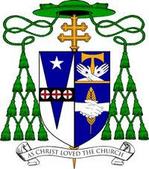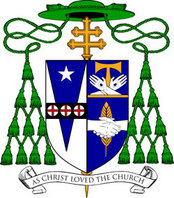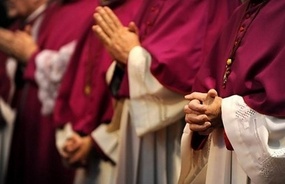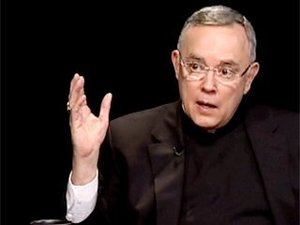Someone who “gets it” is Capuchin Franciscan Archbishop Charles Chaput, archbishop of Denver. Whether it be culture, beauty, healthcare, abortion, immigrant rights, education, politics, preaching, I think the archbishop is a clear thinker and renders a fine and helpful assessment of Christian life and a Christians involvement in the world. Recently, Archbishop Chaput was in Rome to give a talk he titled, “The Prince of This World and the Evangelization of Culture” at the Fifth Symposium Rome: Priests and Laity on Mission. In this address the archbishop addresses questions of culture, beauty, anthropology, faith, evangelization and sin and grace.
What follows is only an excerpt of a longer talk that you can read at the link above. AND I recommend you read the entire text!
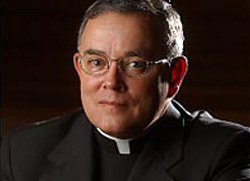
In 1929, as the great totalitarian murder-regimes began to rise up in Europe, the philosopher Raissa Maritain wrote a forgotten little essay called “The Prince of This World.” It is worth reading. We need to remember her words today and into the future. With no trace of irony or metaphor, Maritain argued:
“Lucifer has cast the strong though invisible net of illusion upon us. He makes one love the passing moment above eternity, uncertainty above truth. He persuades us that we can only love creatures by making Gods of them. He lulls us to sleep (and he interprets our dreams); he makes us work. Then does the spirit of man brood over stagnant waters. Not the least of the devil’s victories is to have convinced artists and poets that he is their necessary, inevitable collaborator and the guardian of their greatness. Grant him that, and soon you will grant him that Christianity is unpracticable. Thus does he reign in this world.”
If we do not believe in the devil, sooner or later we will not believe in God. We cannot cut Lucifer out of the ecology of salvation. Satan is not God’s equal. He is a created being subject to God and already, by the measure of eternity, defeated. Nonetheless, he is the first author of pride and rebellion, and the great seducer of man. Without him the Incarnation and Redemption do not make sense, and the cross is meaningless. Satan is real. There is no way around this simple truth.
Let me underline that even more strongly. Leszek Kolakowski, the former Marxist philosopher who died just last year, was one of the great minds of the last century. He was never a religious person in the traditional sense. But Kolakowski had few doubts about the reality of the devil. In his essay Short Transcript of a Metaphysical Press Conference Given by the Demon in Warsaw, on 20th December 1963, Kolakowski’s devil indicts all of us who call ourselves “modern” Christians with the following words:
“Where is there a place [in your thinking] for the fallen angel? … Is Satan only a rhetorical figure? . . . Or else, gentlemen, is he a reality, undeniable, recognized by tradition, revealed in the Scriptures, commented upon by the Church for two millennia, tangible and acute? Why do you avoid me, gentlemen? Are you afraid that the skeptics will mock you, that you will be laughed at in satirical late night reviews? Since when is the faith affected by the jeers of heathens and heretics? What road are you taking? If you forsake the foundations of the faith for fear of mockery, where will you end? If the devil falls victim to your fear [of embarrassment] today, God’s turn must inevitably come tomorrow. Gentlemen, you have been ensnared by the idol of modernity, which fears ultimate matters and hides from you their importance. I don’t mention it for my own benefit – it is nothing to me – I am talking about you and for you, forgetting for a moment my own vocation, and even my duty to propagate error.”
We live in an age that imagines itself as post-modern and post-Christian. It is a time defined by noise, urgency, action, utility and a hunger for practical results. But there is nothing really new about any of this. I think St. Paul would find our age rather familiar. For all of the rhetoric about “hope and change” in our politics, our urgencies hide a deep unease about the future; a kind of well-manicured selfishness and despair. The world around us has a hole in its heart, and the emptiness hurts. Only God can fill it. In our baptism, God called each of us in this room today to be his agents in that work. Like St. Paul, we need to be “doers of the word, and not hearers only” (Jas 1:22). We prove what we really believe by our willingness, or our refusal, to act on what we claim to believe.
But when we talk about a theme like today’s topic – “Priests and laity together, changing and challenging the culture” – we need to remember that what we do, proceeds from who we are. Nothing is more dead than faith without works (Jas 2:17); except maybe one thing: works without faith. I do not think Paul had management issues in his head when he preached at the Areopagus. Management and resources are important – but the really essential questions, the questions that determine everything else in our life as Christians, are these: Do I really know God? Do I really love him? Do I seek him out? Do I study his word? Do I listen for his voice? Do I give my heart to him? Do I really believe he’s there?
For more than 30 years, first as a bishop and now as the successor to St. Peter, Benedict XVI has spoken often and very forcefully about the “culture of relativism” that guides today’s developed world, breaks down human community and intimacy, and drains the meaning out of human activity. That culture flows out of the “new Areopagus” John Paul II described in Redemptoris Missio – a culture formed by radically new technologies and methods of communication; a culture with a power that reshapes how we think, what we think about, and how we organize our personal and social lives.
We have an obligation as Catholics to study and understand the world around us. We have a duty not just to penetrate and engage it, but to convert it to Jesus Christ. That work belongs to all of us equally: clergy, laity and religious. We are missionaries. That is our primary vocation; it is hardwired into our identity as Christians. God calls each of us to different forms of service in his Church. But we are all equal in baptism. And we all share the same mission of bringing the Gospel to the world, and bringing the world to the Gospel.
